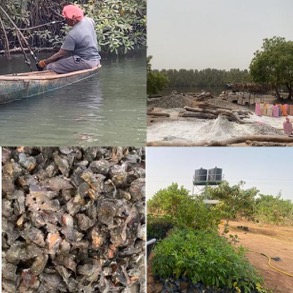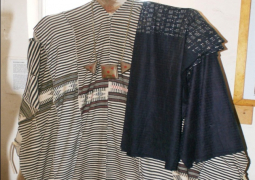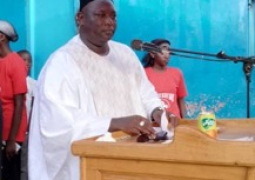
The various projects, such as the Forest Farm Facilities, which supports tree nurseries and Fish for Africa Caribbean and Pacific (ACP), are under the implementation of the FAO funded by the European Union, in partnership with BMZ-Bund and Press ACP.
During a visit to the Oyster farm in Memeh in Jokardu, in the North Bank Region, over 30 years experienced oyster farmer shared her adventure in the work she specialised in and expressed delight to the FAO for the Organisation’s contribution to their livelihood in the oyster farm.
The oyster farmer, Cecilia Sambou, a mother of five children, said her livelihood depended on the farm and she woke up as early as 3 a.m. for work, adding that she barely gets D5,000 every month but that could not stop her from working. “From my business, I provide feeding, school fees and other basic needs for my children,” she said.
She further explained that due to getting oysters processed, she always faced fire smoke, resulting in her eyes not seeing long distances.
“I don't have anyone who could help,” she said, pointing out that because of the FAO, they had formed a ‘compin’ (an enterprise), created a bank account, and other benefits.
Meanwhile, in the North Bank, Lang Conteh, secretary general of the North Bank Tree Nurseries, shed light on the importance of tree nurseries and how it was helpful for them in the community.
He explained that they were facing deforestation in the community, which was the reason they started planting trees in the forest, sell and sometimes, individually giving them to people to plant.
Mr Conteh mentioned that they had over 20 different species in the garden and also supplied more than 500 plants to a few neighboring communities.
He factored out the FAO’s contribution to bringing training packages like compost making and tree nursery, which he said was impactful.
Among other contributions, FAO helped in the construction of roads and storage facilities in the North Bank, in a community called Jerri Kaw Wollof.
The Alkalo, Ousman Touray, appreciated the FAO for their efforts in making sure the community has easy access to roads and storage facilities for their groundnuts.
Alkalo Ousman Touray recalled that they faced difficulties on the road heading to the highway, stating that most pregnant women would give birth on the road to the highway due to poor access.
He also said they used to lack what they worked for due to fire outbreaks or termites destroying the groundnuts. However, he said, the storage facility had been helpful for their groundnuts and now they could save the groundnuts for a longer period and nothing would happen to it.





